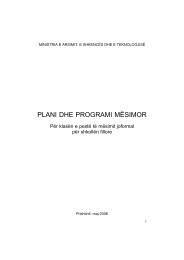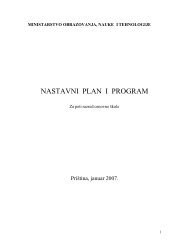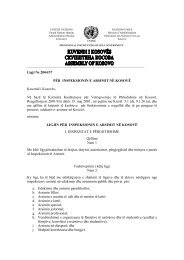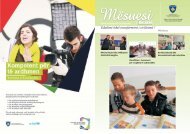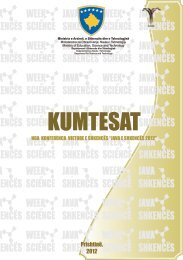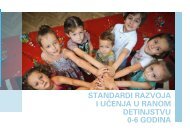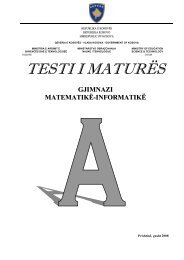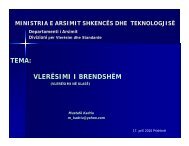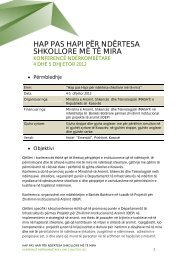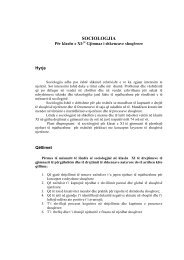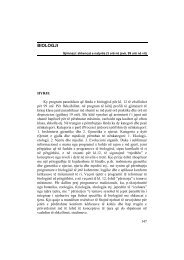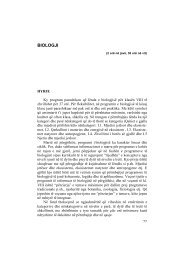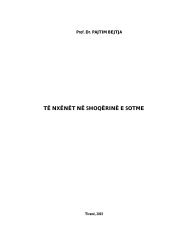Humboldt Kosmos 90/2007: Wissen schafft Entwicklung
Humboldt Kosmos 90/2007: Wissen schafft Entwicklung
Humboldt Kosmos 90/2007: Wissen schafft Entwicklung
Erfolgreiche ePaper selbst erstellen
Machen Sie aus Ihren PDF Publikationen ein blätterbares Flipbook mit unserer einzigartigen Google optimierten e-Paper Software.
<strong>Wissen</strong> <strong>schafft</strong> <strong>Entwicklung</strong> | || From Knowledge to Development <strong>Wissen</strong> <strong>schafft</strong> <strong>Entwicklung</strong> | || From Knowledge to Development<br />
Von Christina Schuh<br />
NACHGEHAkt: BilANz AUs siCHt DEr stiPENDiAtEN<br />
JUst CHECkiNG: FElloWs tAkE stoCk<br />
Wie ergeht es Georg Forster-Forschungsstipendiaten nach<br />
ihrem Aufenthalt in Deutschland? Wie viele Alumni kehren<br />
wieder zurück in ihr Herkunftsland, welchen Problemen<br />
begegnen sie und welche Chancen eröffnen sich ihnen?<br />
Ergebnisse einer Umfrage.<br />
Im Sommer <strong>2007</strong> führte die <strong>Humboldt</strong>-Stiftung zum Jubiläum<br />
des Georg Forster-Programms eine Online-Befragung bei den<br />
273 Stipendiaten durch, die bis Juni <strong>2007</strong> ihren Erstaufenthalt<br />
beendet hatten. Gefragt wurde nach dem Einfluss des Georg Forster-Stipendiums<br />
auf die berufliche Karriereentwicklung der Stipendiaten<br />
und auf das Mobilitätsverhalten im Anschluss an den<br />
Stipendienaufenthalt, aber auch nach möglichen Wiedereingewöhnungsschwierigkeiten<br />
bei der Rückkehr ins Heimatland. 215<br />
Alumni antworteten – was einen Rücklauf von fast 80 Prozent<br />
bedeutet. Auch die Länder- und Fächerverteilung der Befragung<br />
ist weitestgehend repräsentativ. Von Ingenieurwissenschaftlern<br />
und Stipendiaten aus der Region Subsahara-Afrika gibt es einen<br />
überproportionalen Rücklauf, Geisteswissenschaftler und Stipendiaten<br />
aus der Region Asien und Pazifik haben unterproportional<br />
geantwortet.<br />
Über 95 Prozent der Stipendiaten, die geantwortet hatten, sind<br />
inzwischen wieder in ihre Herkunftsländer zurückgekehrt und<br />
dort wissenschaftlich tätig (siehe Abbildung auf Seite 27). 70 Prozent<br />
halten noch immer aktiv Kontakt zu ihrem wissenschaftlichen<br />
Gastgeber in Deutschland. Damit erfüllen sie die entscheidenden<br />
Voraussetzungen, um die internationale Vernetzung<br />
aufrechtzuerhalten und ausbauen zu können. Etwa die Hälfte der<br />
Antwortenden hatte bei der Entscheidung zurückzukehren Karrieremöglichkeiten<br />
im Blick; ein Drittel mit einem konkreten Stellenangebot,<br />
und viele geben an, ein bereits vor dem Stipendium<br />
bestehendes Arbeitsverhältnis fortsetzen zu können. Ebenfalls die<br />
Hälfte gibt als weiteren Grund für die Rückkehr die gefühlte Verpflichtung<br />
gegenüber dem Heimatland an. Einer der Befragten<br />
kehrte beispielsweise zurück, „um mitzuhelfen, Wasser- und<br />
Umweltprobleme in meinem Land zu lösen, und um neue Technologien<br />
für mein Forschungsteam bereitzustellen”.<br />
Eine weitere wichtige Voraussetzung für den wissenschaftlichen<br />
Transfer zwischen Deutschland und den jeweiligen Heimatländern<br />
der Alumni ist, dass die Stipendiaten auch heute noch<br />
aktiv in <strong>Wissen</strong>schaft und Forschung sind. Das ist bei über 95<br />
Prozent der Antwortenden der Fall. Lediglich acht der Befragten<br />
By Christina Schuh<br />
How do Georg Forster research Fellows fare after their stay<br />
in Germany? How many alumni return to their countries of<br />
origin, what problems do they face, and what opportunities<br />
open up for them? Findings of a survey.<br />
On the anniversary of the Forster Programme in summer <strong>2007</strong>,<br />
the <strong>Humboldt</strong> Foundation carried out an online survey of the 273<br />
fellows who had completed their first stay by June <strong>2007</strong>. They were<br />
asked on the one hand, about the influence of the Georg Forster<br />
Fellowship on their professional career development and mobility<br />
following the research stay and on the other, about any reintegration<br />
difficulties on their return to their own countries. 215 alumni<br />
replied – a response rate of almost 80 percent. Distribution<br />
according to country and discipline is largely representative, too.<br />
Disproportionately high response rates come from engineering<br />
scientists and fellows from Sub-Saharan Africa, while those for<br />
humanities scholars and fellows from Asia and the Pacific regions<br />
are disproportionately low.<br />
More than 95 percent of the fellows who responded are now back<br />
in their countries of origin and working in academia (see figure<br />
on page 27). 70 percent are still in active contact with their academic<br />
hosts in Germany. They thus fulfil the decisive preconditions<br />
for maintaining and extending international networking.<br />
More than half of those who responded had serious career prospects<br />
when they returned home; a third had a concrete job offer,<br />
and many say they had been able to return to a position they had<br />
held before the fellowship. Half also state that another reason for<br />
returning was the commitment they felt to their own countries.<br />
One of those asked, for example, had returned “to help solving<br />
water and environmental problems in my country and to have<br />
new technology for my research team“.<br />
A further important precondition for scientific transfer between<br />
Germany and the alumni’s own countries is that fellows are still<br />
actively involved in research today. This is true in 95 percent of<br />
cases. A mere eight of those asked said they were employed in<br />
another field or out of work. The alumni’s academic success is<br />
demonstrated, amongst other things, by the fact that almost a fifth<br />
of them have since managed to become full professors and 15 percent<br />
have advanced from being post-docs to senior lecturers. In<br />
many cases, the scientific results of cooperation with their German<br />
hosts and the stay in Germany itself may have had a positive<br />
geben an, in einem anderen Feld<br />
beschäftigt beziehungsweise ohne<br />
Anstellung zu sein. Der wissenschaftliche<br />
Erfolg der Alumni<br />
zeigt sich unter anderem darin,<br />
dass fast ein Fünftel von ihnen<br />
mittlerweile den Sprung zum<br />
Full Professor ge<strong>schafft</strong> hat und 15<br />
Prozent vom Postdoc zum Senior<br />
Lecturer aufgestiegen sind. In vielen<br />
Fällen mag das wissenschaftliche<br />
Ergebnis der Kooperation<br />
mit dem deutschen Gastgeber<br />
beziehungsweise der Deutschlandaufenthalt<br />
insgesamt die Karriereentwicklung<br />
positiv beeinflusst<br />
haben. Über 80 Prozent der<br />
Antwortenden haben mindestens<br />
eine Zeitschriftenpublikation als<br />
Ergebnis ihres Deutschlandaufenthalts<br />
vorzuweisen, ein Drittel<br />
sogar mehr als drei Artikel. Hinzu<br />
kommen noch Tagungsbeiträge<br />
(71 Prozent) und Monographien<br />
(16 Prozent).<br />
Neue Mitglieder der <strong>Humboldt</strong>-Familie<br />
Die Alumni selbst bestätigen in der Online-Befragung den<br />
erhofften Transfer von <strong>Wissen</strong> und Methoden (siehe Tabelle auf<br />
S. 28). Der Aussage „Ich habe neue wissenschaftliche Methoden<br />
kennengelernt“ stimmen 92 Prozent der Umfrage-Teilnehmer<br />
voll zu. Sie betonen vor allem den positiven Nutzen des Georg<br />
Forster-Stipendiums für ihre Karriere, den besseren Zugang zu<br />
internationalen wissenschaftlichen Netzwerken, den Erwerb von<br />
Kenntnissen der deutschen Kultur, die bessere Ausstattung, die<br />
durch eine Alumni-Förderung am Heimatinstitut erreicht werden<br />
konnte, und stellen auch einige ganz persönliche Erfahrungen<br />
heraus wie „Ich habe gelernt, die Stärken und Schwächen meiner<br />
Arbeit besser einzuschätzen“ oder „Ich war in meiner Forschung<br />
unabhängiger.”<br />
Wo siND siE DAUErHAFt BEsCHäFtiGt?<br />
WHAt is yoUr CoUNtry oF PErMANENt EMPloyMENt?<br />
Anzahl der Antworten N=215 | || Number of responses N=215<br />
16 % Lateinamerika, Karibik<br />
17 % Maghreb, Nahost<br />
und Mittlerer Osten<br />
1 % Nordamerika und Kanada<br />
2 % Westeuropa<br />
3 % keine Angaben<br />
35 % Afrika, Subsahara<br />
14 % Asien und Pazifik<br />
12 % Osteuropa, Kaukasus<br />
und Zentralasien<br />
influence on their career development as a whole. More than 80<br />
percent of those who answered had at least one publication in a<br />
journal to show for their stay in Germany, a third had even more<br />
than three articles. In addition, there were conference papers (71<br />
percent) and monographs (16 percent).<br />
New members of the <strong>Humboldt</strong> Family<br />
In the online survey, the alumni themselves confirm that the<br />
hoped-for transfer of knowledge and methods had taken place (see<br />
table on page 28). 92 percent of participants fully agree with the<br />
statement, “I have learnt new scientific methods“. They emphasise,<br />
above all, the positive benefits of the Georg Forster Fellowship for<br />
their careers, greater access to international academic networks,<br />
knowledge gained about German culture, improved equipment<br />
procured at home on the strength of alumni sponsorship, and,<br />
24 <strong>Humboldt</strong> kosmos Sonderausgabe 2008<br />
25



